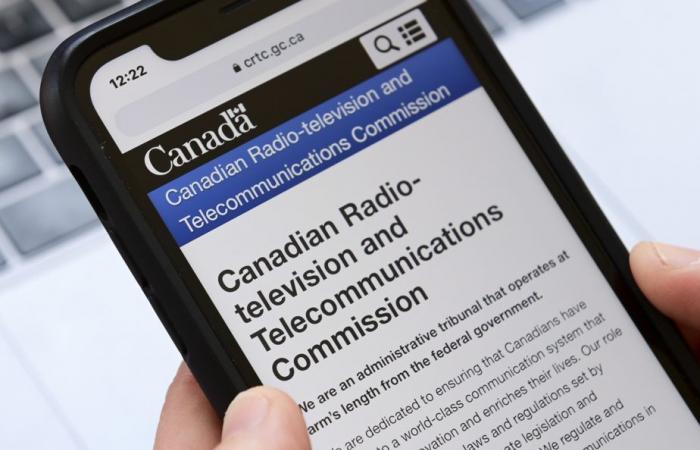(Ottawa) The Liberal government has spent years touting its efforts to make tech giants pay. Now, these bills could be a target of the Trump administration — particularly the digital services tax that requires big tech companies to make a large retroactive payment in June.
Posted at 8:52 a.m.
Anja Karadeglija
The Canadian Press
The leaders of America’s largest technology companies attended Donald Trump’s inauguration on Monday. They included Amazon founder Jeff Bezos, Meta’s Mark Zuckerberg, Apple’s Tim Cook and Google’s Sundar Pichai, as well as Tesla chairman and chief executive and staunch Mr. Trump supporter Elon Musk.
Meredith Lilly, a professor at the Norman Paterson School of International Affairs at Carleton University, said Canada is a relatively small market for large U.S. technology companies.
But despite this, they remain close to the Trump administration and they probably have its ear to a certain extent, according to her. Mme Lilly therefore expects that these companies “want certain measures towards Canada, in particular on the digital services tax”.
The tax applies to companies that operate online marketplaces, online advertising services and social media platforms, as well as those that earn revenue from certain sales of user data. It imposes a 3% levy on the revenue that foreign technology giants generate from Canadian users.
It is retroactive to 2022 and covers companies such as Amazon, Google, Facebook, Uber and Airbnb. Companies are required to file a declaration by June 30. The Parliamentary Budget Officer estimated that the tax would raise $7.2 billion over five years.
A first decree
Under former US President Joe Biden, the United States already opposed this tax. President Donald Trump signed an executive order on his first day back in office withdrawing the United States from an international effort to establish digital tax rules.
The executive order directs the U.S. Treasury Secretary to investigate countries whose tax rules are “extraterritorial or disproportionately affect U.S. businesses.”
Mme Lilly points out that the wording of the executive order suggests that the United States will go after all countries that have implemented similar taxes, including France and the United Kingdom. She said the most direct way for the United States to voice its concerns would be through the Canada-United States-Mexico Agreement (CUSMA).
Meredith Lilly clarifies that the executive order directs the Secretary of the Treasury to report to the President within 60 days, which would be mid-March.
“I expect discussions with any country that has a digital services tax in place to accelerate rapidly thereafter,” she said.
-An “obvious target”
University of Ottawa law professor Michael Geist, who specializes in e-commerce, said the order makes Canada’s digital services tax “an obvious target.”
He said in an online message Tuesday that “given the efforts of big tech companies to curry favor with the new U.S. administration, it is to be expected that eliminating the tax will become a key demand of the UNITED STATES “.
And the digital services tax may not be the only element of Canadian regulation in the crosshairs.
“I think that the Online streaming law “will get their attention, in part because there are very influential tech companies that are now closely tied to the president, and none of them like Canada’s streaming law,” Ms.me Lilly.
The bill had updated broadcasting laws to encompass online platforms. In recent days, groups representing U.S. businesses and major technology companies have warned the CRTC that its efforts to implement this legislation – particularly the requirement that large foreign streaming companies contribute financially to the creation of Canadian content – could worsen the trade conflict with the United States.
“Now is not the time for Canada to call on the new administration to retaliate on trade issues,” the U.S. Chamber of Commerce told the broadcast regulator in a filing in the part of a CRTC procedure on a new definition of Canadian content.
The Motion Picture Association–Canada, which represents major streaming companies such as Netflix, Disney and Amazon, also recently launched an ad campaign against the CRTC’s efforts, warning of a “new tax that could drive up taxes.” price “. Mme Lilly said the United States could address this issue as part of the CUSMA review.
Mr. Geist said another target could be the Online News Act, which requires technology companies to enter into agreements with news publishers. Google, which is so far the only company affected by the legislation, paid 100 million to a journalism organization intended to distribute the funds.
A way to obtain concessions
Michael Geist, who has criticized all three bills, said in an email that the United States could include all of them in its overall demands regarding Mr. Trump’s threat to impose 25% tariffs. % in Canada, “in the hope of obtaining concessions from the Canadian government”.
They could also use “CUSMA Dispute Resolution and Executive Order […] to voice their concerns and encourage Canada to delay or abandon the digital services tax.
He noted that the United States could also use the reopening of CUSMA negotiations to put the streaming and online news bills “on the table.”





